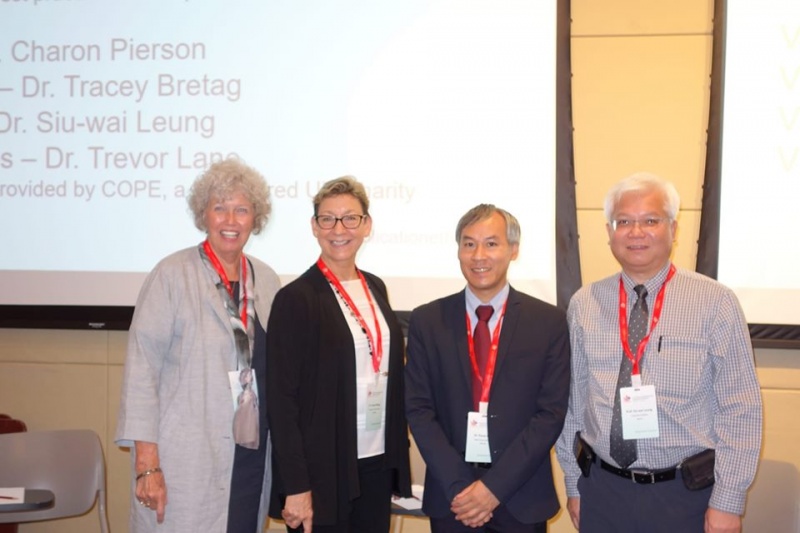Summary of Responsible authorship panel at WCRI2019
 Our session on the first day of the conference was a panel discussion describing the preliminary analysis of 134 authorship cases presented to the COPE Forum between 1997 and 2018, followed by presentations exploring best practices for responsible authorship. The presenters were Dr. Charon Pierson (COPE Council) with a View from COPE, Dr. Tracey Bretag (COPE Council) with a View from Institutions, Dr. Siu-wai Leung (University of Macau) with a View from Journals, and Dr. Trevor Lane (COPE Council) with a View from Third Parties. Following the panel presentations, we had an engaging discussion on many issues of concern to the audience.
Our session on the first day of the conference was a panel discussion describing the preliminary analysis of 134 authorship cases presented to the COPE Forum between 1997 and 2018, followed by presentations exploring best practices for responsible authorship. The presenters were Dr. Charon Pierson (COPE Council) with a View from COPE, Dr. Tracey Bretag (COPE Council) with a View from Institutions, Dr. Siu-wai Leung (University of Macau) with a View from Journals, and Dr. Trevor Lane (COPE Council) with a View from Third Parties. Following the panel presentations, we had an engaging discussion on many issues of concern to the audience.
Here are a few highlights from the presentations
The qualitative analysis of cases related to authorship and contributorship reflects several broad categories of intentional and unintentional behaviours by authors that editors find difficult to manage. The five most common problems include: claims of stolen data, methods, or intellectual content (31%); incomplete, inconclusive, or suspicious institutional investigations (18%); undeclared conflicts of interest (18%); misconduct in conducting, analysing, or reporting findings (19%); and duplicate publication or salami slicing (14%). Specific author behaviours leading to disputes include: questionable changes to author list after submission (27%); submission without knowledge of one or more authors (19%); claims of unacknowledged authorship (21%); ghost, guest or gift authors (19%); disputed order of authorship (7%); and forged paperwork (7%). An analysis of one case was presented to illustrate the complexity of competing claims, unresolved investigations, and legal issues faced by an editor attempting to resolve a dispute prior to publishing a paper.
From the institutional perspective there is a need for clear definitions and criteria of authorship at the institutional level, governed by national codes of ethical conduct, for a research integrity officer to effectively investigate a complaint. A clear process and procedure must also be followed, and all involved must have a clear understanding of what can be expected from an institutional investigation. Academic institutions are frequently involved with authorship disputes between students and supervisors, so clear policies are essential for fair decisions. Training and education on the responsible conduct of research for students and faculty at universities is mandated in some countries and by some funding agencies, but implementation is not always robust.
From the journal editor’s perspective, the first requirement is to have authorship criteria clearly stated on the journal website and follow procedures to verify that the authorship criteria have been met. This most often involves statements of contribution to the project by each author. Journals may require a specific format for declaring contributions or may refer authors to specific websites to assist them in determining authorship order and determination of contributorship. Some examples include www.authorships.org or www.casrai.org/credit or https://www.apa.org/science/about/psa/2015/06/determining-authorship For many manuscripts, a simple spreadsheet with the journal’s authorship criteria listed along with the people involved in all aspects of the project will suffice.
The last presentation described best practices when third-party editorial services are involved in assisting authors in the development of a manuscript. This practice is increasingly common in non-English speaking countries where publication in English language journals is required for graduation, promotion, tenure, or job advancement. The China Association for Science and Technology published the 5 Don’ts for working with editorial services: DO NOT 1) Ask someone else to write the manuscript; 2) Ask someone else to submit your article; 3) Ask someone else to revise the research content; 4) Give false reviewer information or manipulate peer review; 5) Violate ethical standards and responsibility required of manuscript authors. Authors need to beware of unethical services that mimic or hijack legitimate editorial support services; they can find guidance on legitimate services at the Alliance of Scientific Editing in China (www.asec.org.cn/file/3-ASEC-GoodEditingPractice.pdf). Specifically for medical writing and editing, the International Society of Medical Publication Professionals (ISMPP) has guidelines for working with professional medical writers (http://www.ismpp.org/gpp3).
COPE past Secretary, Charon Pierson on behalf of the COPE members on the panel